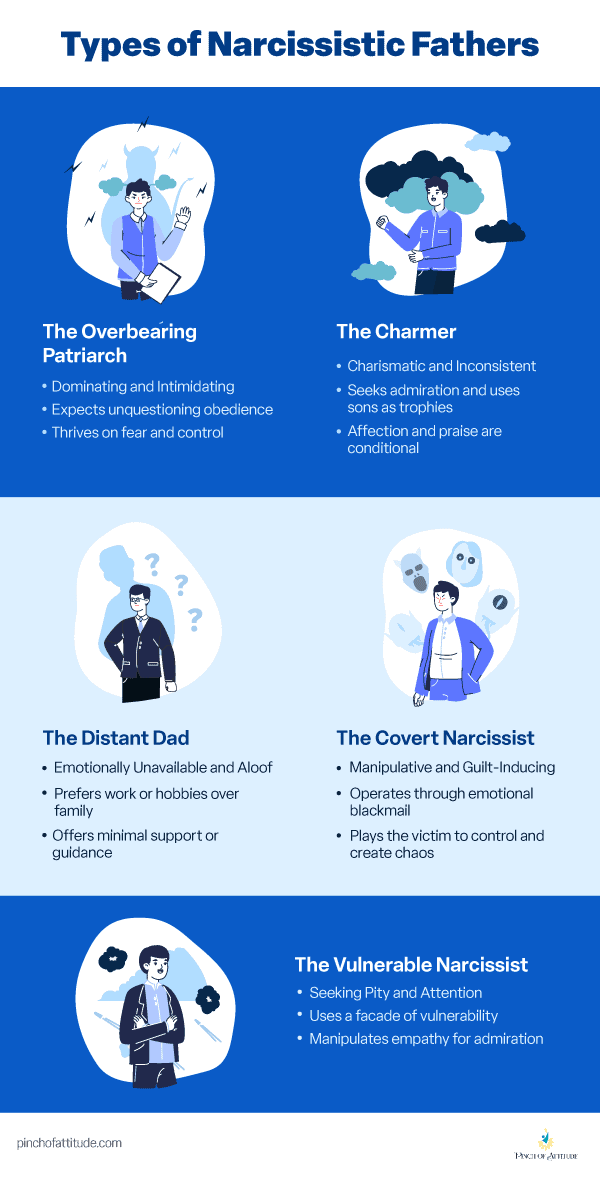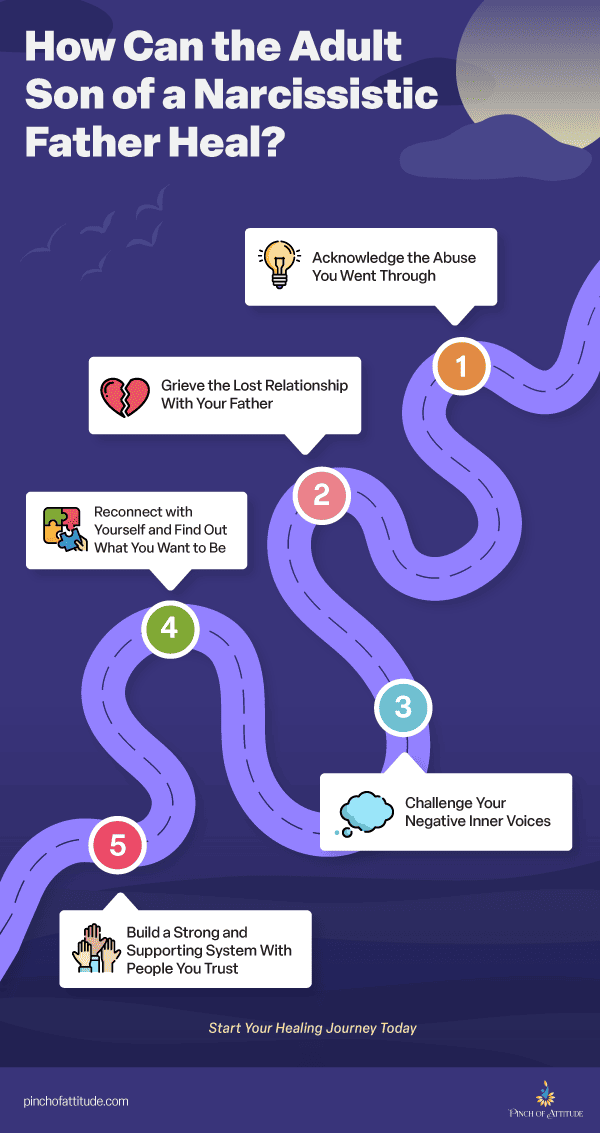Ever feel like your dad walks into a room and sucks all the air out? Like conversations turn into his solo stand-up routine, and your opinions are punchlines?
If “daddy dearest” means something more than a cheesy ‘80s movie, you might be navigating the tricky terrain of a narcissistic father-and-son relationship.
As a daughter of a narcissist mom myself, I get it. And even though it might not feel like it now, there’s a way out of this gravitational pull.
Below, we’ll unpack the telltale traits, the emotional toll, and, most importantly, how to build your own path without getting sucked into the black hole of his ego.
- You can rise above your father’s shadow. His negativity doesn’t define you.
- Your struggles are real, and you’re not alone. You can choose healing, set boundaries, and build a life filled with genuine connection and joy.
- You have the strength to overcome your past. Celebrate your progress, prioritize self-compassion, and write your own story of resilience and fulfillment.
Table of Contents
13 Traits of Sons of Narcissistic Fathers

So, you grew up with a dad who could charm a room and then tear you down with a single sentence.
Let’s face it, that kind of narcissist father-son relationship leaves its mark.
But before you write yourself off as a permanent doormat, there are some pretty common characteristics that children of narcissistic parents tend to share.
1. You Constantly Seek Approval
Ever chase a butterfly, watch it just out of reach, then chase it harder? That’s kinda what seeking your father’s approval feels like.
You pour your heart into everything, hoping that achievement equals a pat on the back, a “good job, son.”
But his praise, if it comes at all, feels fleeting. It leaves you hungry for more, wondering if “enough” will ever be enough.
It’s a never-ending quest for self-confidence your narcissistic father may never validate, a love and approval that might always feel just out of reach.
2. You Struggle With Low Self-Esteem
Imagine a life where every compliment felt like a backhanded jab, every misstep a neon sign of your inadequacy.
That’s the low self-esteem that comes with growing up with a narcissistic father.
Because of your lack of confidence, you doubt your every decision, second-guess your talents, and shrink in the face of opportunities.
It’s like carrying a voice in your head constantly whispering, “Not good enough, son,” even when you’re winning at life.
3. You’re a People Pleaser
Sons of narcissistic fathers may struggle with people-pleasing, bending over backward to avoid conflict or disappointment.
Remember that childhood dance of keeping Dad happy? It turns into a habit, a way to navigate the emotional minefield.
You anticipate his needs, suppress your own, and prioritize keeping everyone else calm, even if it means swallowing your own feelings.
As a daughter of a narcissistic mother, I can relate.
Maybe it was walking on eggshells around her moods, anticipating her criticisms, or trying to earn her fleeting approval.
We both know the exhaustion of that emotional tightrope walk. But here’s the thing: our happiness and well-being matter, too.
4. You Have Difficulty Setting Boundaries
Growing up with narcissistic dads who control their son’s every move, prioritizing the needs of others becomes second nature.
Saying “no” feels like navigating a minefield, so “yes” becomes the default, even when it leaves you feeling drained and resentful.
But you deserve a space where your needs are heard, your boundaries are honored, and you can finally take a deep breath and say, “This is my space, and I’m choosing myself.”
Tip
Setting clear boundaries isn’t selfish, it’s self-compassion. Rewrite the script and build a stage where your well-being takes center stage.
5. You’re Prone to Codependency
Children of narcissists sometimes get sucked into codependency, made to believe their happiness hinges on solving everyone else’s problems.
It spills over into relationships with others, where you become the fixer, the therapist, the emotional lifeguard, all rolled into one.
This creates a toxic pattern where you pour your energy into keeping everyone afloat and leave your own needs bone-dry.
I was the same way. But I realized that I needed to fill my own emotional cup first.
Only then can you build relationships where giving and receiving are balanced, not a one-way street.
You deserve to be loved for who you are, not just for what you can offer.
6. You Experience Emotional Dysregulation
Growing up with a narcissistic father can leave you in a constant flux of anger, sadness, and confusion.
His unpredictable moods and tendency to play mind games can make you lash out in anger, shut down completely, or oscillate between extremes.
But remember, you’re not the malfunctioning machine – he is. You deserve a calmer, more predictable emotional landscape.
Learn to identify your triggers, practice healthy coping mechanisms, and build a support system that validates your feelings can help you rewrite the rules of this game.
7. You’re a Perfectionist
Growing up with a dad who seems to belittle anything less than flawless can leave a son feeling like they will never be good enough.
They strive for straight As, the winning goal, the perfectly manicured lawn, but it will always feel like they can never measure up.
This creates a fear of failure that hangs heavy.
But the truth is, you’re a human being, messy and magnificent in your own way. Progress, not perfection, is the true measure of success.
Tip
Perfection is a myth. Strive to find joy in the process of creation, not just the finished product.
8. You Have Difficulty Trusting Others
Adult sons of dads with narcissistic traits often live with the curse of finding it difficult to trust.
You see, growing up with a father who manipulates, gaslights, and breaks promises can warp your relationship patterns.
You might build walls around your heart, afraid to let anyone in for fear of getting burned again.
It’s like wearing emotional armor, heavy and cold, but strangely comforting in its familiarity.
But you have to realize that not everyone is like your father. There are people out there who will cherish your trust, not exploit it.
9. You’re Prone to Addiction
Growing up in a chaotic, unpredictable environment where emotional abuse is the norm can make a child feel helpless, searching for escape.
Drugs, alcohol, or even risky behaviors can be a temporary balm, a numbing agent against the pain of feeling unseen, unheard, and undervalued.
It’s like stepping into a fog, hoping it will obscure the reality of your situation, a way to silence the inner critic that echoes your narcissistic father’s voice.
But even if it feels like an uphill climb, healing is possible. You can find healthy ways to cope with your emotions, to build a life where you feel empowered, not helpless.
Tip
Addiction is a symptom, not a sentence. Reach out for support, build a network of healthy relationships, and explore safe ways to process the past.
10. You Experience Self-Blame and Guilt
Do you feel like your father’s happiness or success is your responsibility?
Are his failures (real or perceived) yours to bear, his outbursts a reflection of whether you are unworthy or not in his eyes?
Growing up in such an environment can leave you feeling like you’re responsible for your dad’s moods.
You might second-guess yourself, wondering if you could have done more, or been better. It’s a heavy cloak to wear, this guilt, woven from threads of “what ifs” and “if onlys.”
But the reality of the situation is that his failures are his own, not yours to shoulder.
Forgive yourself for the things you couldn’t control, release the weight of unfair blame, and let go of the guilt that doesn’t belong to you.
11. You’re a High Achiever
Sons of fathers with narcissism often know the pressure to be a high achiever.
It’s like living in a performance review, constantly chasing the next gold star, the next pat on the back.
A narcissist uses these achievements as a leash, a way to try to control his son.
So, you climb the ladder, win the awards, and ace the exams, hoping for a flicker of genuine pride.
It’s all driven by a mix of proving yourself and earning that elusive pat on the back, always just out of reach.
But you know what I realized? Your greatest achievement is being true to yourself, not living to someone else’s impossible standards.
12. You Have a Complicated Relationship With Anger
There’s a good chance your father is a narcissist if you grew up with one who’s emotionally unavailable.
Did you grow up bottling up your feelings until they explode in unpredictable bursts?
A narcissist’s son may lash out at loved ones, push people away, or turn it inward, simmering in silent resentment.
But anger is a normal emotion, not a bomb destined to detonate.
By reaching out to a mental health professional, you can learn healthy ways to express it, channel it, and understand its triggers.
13. You’re Resilient and Empathetic
Witnessing your father’s lack of empathy for others might have made you hyper-aware of those hurting around you.
You know what it’s like to walk on eggshells, so you tiptoe around others’ pain with a gentle touch. You’ve seen the fallout of broken promises, so you build trust brick by brick.
His failures became your fuel, your drive to be the opposite, the kind of person who makes the world a little less cold.
But remember that being there for others starts with being there for yourself. If your father fails to show up for you, do it for yourself.
Tip
You’re not responsible for fixing everyone’s pain, but you can make a genuine difference by simply being the person you wish your father could have been.
What Are the Heavy Impacts of Narcissist Fathers on Their Sons?
A narcissistic father can have a profound impact on a son’s emotional development, self-esteem, and relationships.
His narcissistic behavior causes the son to question his own worth, struggle with trust and intimacy, and develop unhealthy coping mechanisms.
Sons of narcissistic fathers often struggle with the following:
- Identity issues: The focus on the father’s needs and the lack of healthy emotional connection can leave sons struggling to understand their own identities. They may question their worth, values, and place in the world.
- Anxiety and depression: The unpredictable and often chaotic environment created by narc fathers can be a breeding ground for anxiety and depression. Sons may experience chronic worry, low mood, and difficulty managing their emotions.
- Post-traumatic stress disorder (PTSD): In extreme cases, the unpredictable and traumatic experiences of living with a narcissist father can meet the criteria for PTSD. This can manifest in symptoms like flashbacks, nightmares, hypervigilance, and emotional detachment.
It’s important to remember that every individual’s experience is unique, and the effects of a narcissistic father will vary depending on various factors.
However, understanding these potential consequences can be a valuable step in healing and building a healthier future.
Types of Narcissistic Fathers and Their Impacts on Sons
While narcissistic fathers all share a core of self-absorption and a need for control, their tactics and personalities can vary quite a bit.
Some of the most common types of narcissistic fathers include:
- The overbearing patriarch: This dad holds the reins tight, dictating his family’s lives and expecting unquestioning obedience. He thrives on fear and intimidation, leaving his sons feeling small and pressured to live up to an impossible image.
- The charmer: Smooth-talking, charismatic, and the life of the party – at least on the surface. This dad doles out praise and affection in inconsistent doses. He seeks admiration above all, using his sons as trophies or extensions of himself.
- The distant dad: Emotionally unavailable and aloof, this dad prefers the company of his work, hobbies, or anyone else but his family. He offers little to no support or guidance. His silence screams louder than any words ever could.
- The covert narcissist: Less flashy than his counterparts, the covert narcissist operates through manipulation and emotional blackmail. He plays the victim, guilt-trips his sons, and thrives on creating drama and chaos.
- The vulnerable narcissist: This dad seeks pity and attention through a facade of vulnerability. He shares his “failures” and insecurities, but only to manipulate empathy and admiration.
Which of these do you think fits your dad?
Remember, though, the line between these types can blur. The important thing is to recognize the behaviors that leave you drained, manipulated, or emotionally neglected.
How to Deal With a Narcissistic Father and Son Relationship?
Narcissistic fathers are driven by their need for control and validation, which can leave deep scars on a son’s self-esteem and emotional well-being.
But you have the power to create space and protect yourself from the negative effects of this dynamic.
More than anything, setting healthy boundaries is key.
This may involve limiting contact, saying “no” to unreasonable demands, and communicating your needs and expectations.
Remember, boundaries are not walls. They’re fences that define your own space and help maintain respect in the relationship.
Seeking support is also important. Talk to a trusted friend, therapist, or support group for sons of narcissistic fathers.
Sharing your experiences and challenges can validate and empower you to develop healthy coping mechanisms.
Prioritize self-care whenever you can. Engage in activities that nourish your mind, body, and spirit. They can provide a sense of calm and rebuild your inner strength.
Finally, it’s important to be mindful of your own expectations and limitations. Healing from the impact of a narcissistic father is a marathon, not a sprint.
Be patient with yourself and accept that there will be setbacks.
Tip
True healing comes from putting your well-being at the forefront, even if it means navigating a different kind of relationship, or at times, having no relationship at all, with your father.
How Can the Adult Son of a Narcissistic Father Heal?

Recovering from narcissistic abuse can feel like climbing a mountain, but the view from the peak is worth the struggle.
As an adult son, you have the power to rewrite your narrative and reclaim your life. Here are some strategies to guide you on your journey of recovery:
Step 1: Acknowledge the Abuse
The first step is acknowledging that what you experienced was, in fact, abuse.
Narcissistic fathers, whether they may be absent physically or emotionally, can still inflict deep emotional wounds through their manipulativeness, criticism, and lack of empathy.
Recognizing this truth paves the way for healing.
Step 2: Grieve the Lost Relationship
You may grieve the father you never had, the one who was emotionally unavailable or incapable of healthy love.
Allow yourself to express this grief, whether through journaling, therapy, or talking to a trusted friend. Bottling up emotions only hinders healing.
Step 3: Challenge Negative Inner Voices
Your father’s words and actions might echo in your head as self-doubt and negative self-talk.
Learn to identify these “father tapes” and counter them with affirmations that reflect your true worth and abilities.
Remember, what your father said or did was not a reflection of you, but of his brokenness.
Step 4: Reconnect With Yourself
To overcome the effects of narcissistic abuse, reconnect with your passions, hobbies, and values. What excites you? What makes you feel alive?
Explore those interests and rediscover the person you were before the darkness of his influence.
Step 5: Build a Support System
Surround yourself with people who love and respect you for who you are.
Lean on friends, family members, or a therapist who understands the complexities of narcissistic abuse.
Sharing your story and receiving validation can be immensely healing.
Related Posts:
- 15 Common Characteristics of Sons of Narcissistic Fathers
- 10 Symptoms of Sons of Narcissistic Fathers: How You Heal
- What Is It Like Growing Up With a Narcissistic Father? Here’s My Story
- 17 Narcissistic Father Abuse Tactics and Its Ugly Effects on You
- How to Heal From a Narcissistic Father: 11 Helpful Ways So You Can Start Right!
Frequently Asked Questions
Do narcissistic fathers produce narcissistic sons?
Sons of narcissistic fathers can, but not always, have narcissistic traits or become narcissists themselves. The influence varies, with some adopting similar personality traits while others resist the cycle.
What are some common experiences shared by sons of narcissistic fathers?
Growing up with a narcissistic father can leave sons grappling with constant criticism, manipulation, and feeling like their needs are secondary.
What are the other possible outcomes of having a narcissistic father?
While negative effects are common, sons of narc fathers can develop resilience and empathy. They may grow to be fiercely independent and have heightened sensitivity to others’ needs.
How do you protect your son from his narcissistic father?
Protect your son by giving him support, validating his emotions, and teaching healthy boundaries. Seek professional help if needed.
What happens to the son of a narcissistic father in adulthood?
An adult son of a narcissistic father may struggle with self-esteem, relationships, and emotional well-being because of the patterns learned in childhood.


